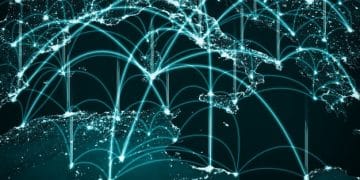The Future of Work: AI and Automation’s Impact on US Jobs by 2030

The Future of Work: How Will AI and Automation Reshape the US Job Market by 2030? involves significant shifts, with AI and automation potentially displacing some jobs while creating new opportunities that require different skills and expertise.
The conversation around the future of work is buzzing with both excitement and apprehension. The Future of Work: How Will AI and Automation Reshape the US Job Market by 2030? is a question that many Americans are asking as technology continues to rapidly advance.
What impact will AI and automation have on job security and career paths? Let’s explore this fascinating topic together.
Understanding The Future of Work: AI and Automation
To understand The Future of Work: How Will AI and Automation Reshape the US Job Market by 2030?, it’s important to first understand what AI and automation entail. Artificial intelligence refers to the simulation of human intelligence in machines that are programmed to think and act like humans. Automation, on the other hand, is the use of technology to perform tasks with minimal human assistance.
AI’s Impact on Different Industries
AI’s influence is extending across various industries, from healthcare to finance. It’s not just about robots replacing workers on assembly lines; AI is increasingly involved in decision-making processes and data analysis leading to The Future of Work: How Will AI and Automation Reshape the US Job Market by 2030? In healthcare, AI algorithms can analyze medical images to detect diseases earlier and more accurately. In finance, AI is used to detect fraudulent transactions and manage investment portfolios. The integration of AI in these sectors raises concerns about job displacement but also highlights opportunities for new roles that require AI-related skills.
- Healthcare: AI-powered diagnostics and treatment planning.
- Finance: Algorithmic trading and fraud detection.
- Manufacturing: Automation of production lines.
- Transportation: Self-driving vehicles and logistics optimization.

In conclusion, the rise of AI and automation is transforming industries, presenting both challenges and opportunities in the job market. Understanding The Future of Work: How Will AI and Automation Reshape the US Job Market by 2030? involves recognizing the potential for job displacement and the need for workforce adaptation.
Job Displacement vs. Job Creation: The Great Debate
One of the most pressing concerns is the extent to which AI and automation will lead to job displacement. While some studies predict significant job losses, others argue that these technologies will also create new jobs, leading to The Future of Work: How Will AI and Automation Reshape the US Job Market by 2030? To fully grasp this debate, a deeper look into both sides of the argument is necessary.
The reality is more nuanced. While some jobs will undoubtedly be automated or rendered obsolete, new roles focused on AI development, maintenance, and oversight will emerge. The key is whether the pace of job creation can keep up with the pace of job displacement.
Skills in Demand for The Future of Work
As AI and automation transform the workplace, the demand for certain skills will increase. According to the data, skills surrounding communication, digital literacy, critical thinking and creativity will become a must in The Future of Work: How Will AI and Automation Reshape the US Job Market by 2030?
- Technical skills: Programming, data analysis, and AI development.
- Soft skills: Critical thinking, creativity, and communication.
- Adaptability: The ability to learn new skills and adapt to changing job requirements.
The debate surrounding job displacement versus job creation is complex, with valid arguments on both sides. Understanding The Future of Work: How Will AI and Automation Reshape the US Job Market by 2030? requires recognizing that the key to navigating these changes will be workforce upskilling and adaptation.
The Role of Education and Training
As AI and automation reshape the job market, education and training play a vital role in preparing workers for the future. The Future of Work: How Will AI and Automation Reshape the US Job Market by 2030? requires a workforce that is equipped with the skills and knowledge to thrive in a technology-driven environment.
Workers will need to be retrained and upskilled to take on new roles. Educational institutions, government agencies, and private companies must collaborate to provide relevant and accessible training programs.
Lifelong learning will become the norm as workers need to continuously update their skills to keep pace with technological advancements. The emphasis on continuous learning is the key to The Future of Work: How Will AI and Automation Reshape the US Job Market by 2030?
Government Initiatives and Policies
Governments are increasingly recognizing the need to support workers through education and training initiatives. This includes funding for workforce development programs and policies that encourage lifelong learning, affecting The Future of Work: How Will AI and Automation Reshape the US Job Market by 2030?.
- Funding for vocational training programs.
- Tax incentives for companies investing in employee training.
- Policies that support lifelong learning and skills development.

In conclusion, education and training are vital in preparing workers for the changing job market. Navigating The Future of Work: How Will AI and Automation Reshape the US Job Market by 2030? requires a collaborative effort from educational institutions, government, and businesses to provide relevant and accessible training programs.
Industry-Specific Impacts and Opportunities
While AI and automation will affect virtually every industry, the specific impacts and opportunities will vary. The Future of Work: How Will AI and Automation Reshape the US Job Market by 2030? suggests that understanding these industry-specific changes is crucial for businesses and workers alike.
Healthcare
AI is transforming healthcare through improved diagnostics, personalized treatment plans, and automation of administrative tasks. The Future of Work: How Will AI and Automation Reshape the US Job Market by 2030? in healthcare will require professionals who can work with and interpret AI-driven insights.
Finance
In finance, AI is used for fraud detection, algorithmic trading, and customer service. The Future of Work: How Will AI and Automation Reshape the US Job Market by 2030? in the finance sector includes roles that require both financial expertise and AI skills.
Manufacturing
Automation is already prevalent in manufacturing, with robots performing repetitive tasks on assembly lines. The Future of Work: How Will AI and Automation Reshape the US Job Market by 2030? in manufacturing will involve workers who can oversee and maintain these automated systems.
- Healthcare: AI-driven diagnostics and treatment planning.
- Finance: Algorithmic trading and fraud detection.
- Manufacturing: Automation of production lines.
- Transportation: Self-driving vehicles and logistics optimization.
Understanding the unique impacts and opportunities in each industry is essential for navigating The Future of Work: How Will AI and Automation Reshape the US Job Market by 2030?. Adaptability and continuous learning will be key.
Strategies for Businesses and Workers
To successfully navigate The Future of Work: How Will AI and Automation Reshape the US Job Market by 2030?, both businesses and workers need to adopt proactive strategies.
For Businesses:
- Invest in training programs: Provide employees with opportunities to learn new skills and adapt to changing job requirements.
- Embrace automation strategically: Implement automation in a way that complements human workers, rather than replacing them entirely.
- Foster a culture of innovation: Encourage employees to embrace new technologies and ideas.
For Workers:
- Focus on lifelong learning: Continuously update your skills and knowledge to stay relevant in the job market.
- Develop in-demand skills: Focus on acquiring skills that are likely to be in demand in the future, such as technical skills, soft skills, and adaptability.
- Be open to change: Embrace new technologies and job roles, and be willing to adapt to changing circumstances.
By adopting these strategies, businesses and workers can successfully navigate The Future of Work: How Will AI and Automation Reshape the US Job Market by 2030?, ensuring that they are well-positioned for success in a technology-driven world.
| Key Point | Brief Description |
|---|---|
| 🤖 AI and Automation | Driving changes across industries. |
| 📈 Skills in Demand | Technical and soft skills are crucial. |
| 📚 Education & Training | Vital for workforce adaptation. |
| 💼 Industry Impacts | Varied impacts across sectors. |
Frequently Asked Questions
AI and automation are expected to reshape the US job market by displacing some jobs and creating new ones that require different skills to address The Future of Work: How Will AI and Automation Reshape the US Job Market by 2030?
Technical skills such as programming and data analysis, along with soft skills like critical thinking and creativity, will be highly valued. Also digital literacy and communication.
Businesses should invest in training programs, embrace automation strategically, and foster a culture of innovation to get ahead of The Future of Work: How Will AI and Automation Reshape the US Job Market by 2030?.
Education and training are crucial for equipping workers with the skills and knowledge needed to succeed in a technology-driven environment, focusing on continuous learning.
Workers should focus on lifelong learning, developing in-demand skills, and being open to change to adapt to new technologies and job roles throughout The Future of Work: How Will AI and Automation Reshape the US Job Market by 2030?.
Conclusion
As we approach 2030, it is evident that AI and automation will significantly reshape the US Job Market. The Future of Work: How Will AI and Automation Reshape the US Job Market by 2030? presents both challenges and opportunities for businesses and workers.
By adopting proactive strategies, investing in education and training, and embracing a culture of innovation, we can navigate these changes successfully and create a future where technology and human workers thrive together.





